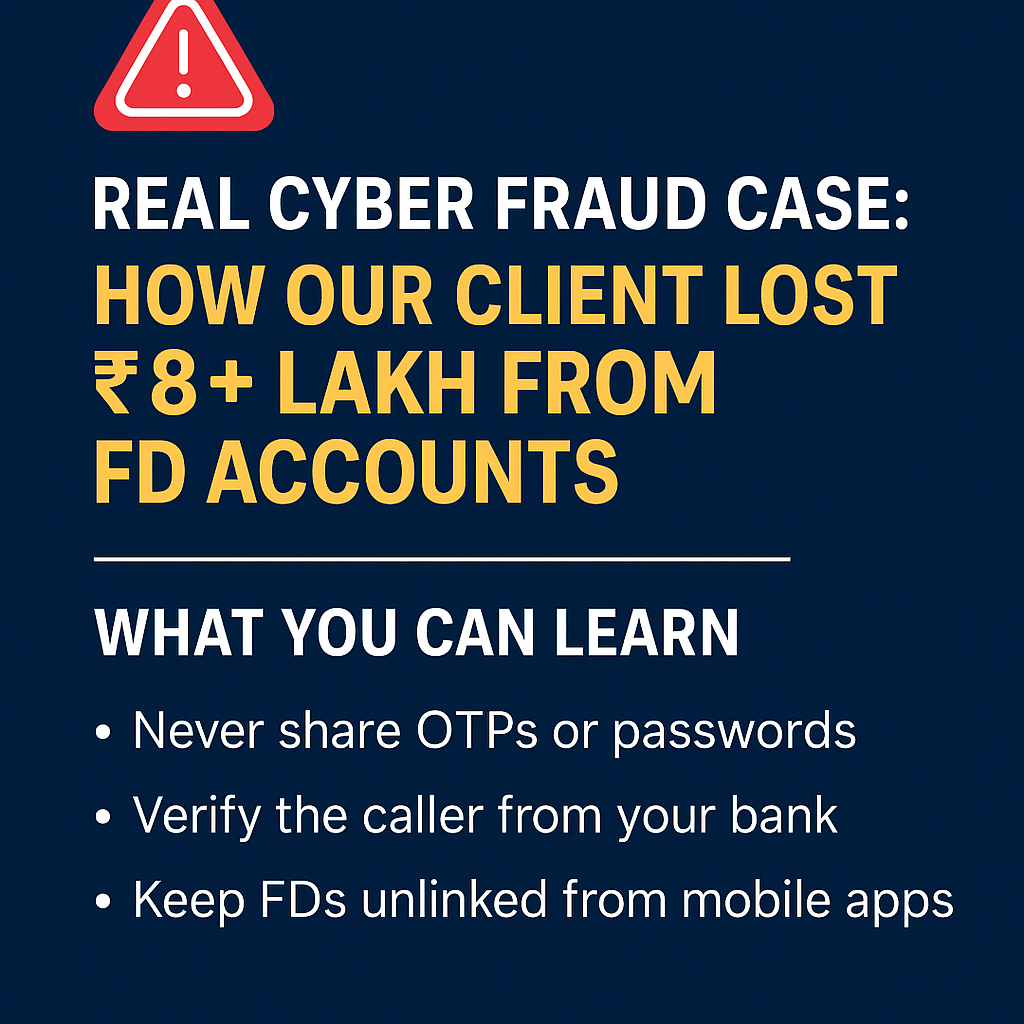Cybercrime is no longer limited to large corporations. In fact, individuals and families are increasingly being targeted by fraudsters who exploit trust, fear, and urgency to steal sensitive financial information.
In this blog, we share a real incident involving one of our clients who lost over ₹8 lakh from Fixed Deposits (FDs) and linked savings accounts — all due to a single scam phone call. This case is a wake-up call for everyone who believes such things only happen to others.
📍 The Incident: A Sophisticated Scam Call
Our client received a distressing call — not from a stranger, but from his daughter. She had just spoken to someone claiming to be a bank representative. The caller informed her about supposed “suspicious activity” in her account and insisted that she urgently share OTPs to verify her identity.
Trusting the voice on the other end, she unknowingly gave access to her bank account.
Within minutes:
- Her savings account was compromised.
- The scammers accessed linked family accounts, including the client’s and his father’s.
- Fixed Deposits were prematurely broken, and ₹8,00,000+ was fraudulently withdrawn.
By the time the family realized what had happened and contacted the bank, the damage was done.
⚠️ How the Fraud Worked: Step-by-Step Breakdown
This wasn’t a random phishing attempt. It was a well-planned social engineering attack. Here’s how the fraud unfolded:
- Caller ID Spoofing
The scammer used a number that appeared to be from a legitimate bank helpline. - Urgency and Pressure
The caller claimed the account had been flagged and might be frozen unless “verified immediately.” - Emotional Manipulation
The daughter was made to believe she was helping to prevent fraud — when in reality, she was enabling it. - OTP Collection
The caller asked for OTPs under the pretext of “identity verification.” These were actually for transactions being conducted in real-time. - Multi-Account Access
Once inside, the fraudsters explored linked accounts and FDs, transferring out large amounts.
🚨 Key Red Flags to Watch For
- Calls asking for urgent action to “secure” your account
- Requests for OTPs, CVV, account number, or UPI PIN
- Claims of suspicious activity from unknown numbers
- A tone of pressure, fear, or threats of account freeze
Remember: Banks never ask for OTPs or sensitive details over a phone call.
🧠 What You Can Learn: Simple Steps to Stay Safe
This case could have been prevented with better awareness. Here’s what you should do to avoid falling victim to such frauds:
1. Never Share OTPs or Passwords
Even if the caller sounds convincing or claims to be from the bank, do not share:
- OTPs
- Net banking passwords
- CVV or debit/credit card details
- Aadhaar or PAN info over the phone
2. Verify the Caller
If someone calls claiming to be from your bank, hang up and call your bank’s official helpline directly. Use the number on the back of your ATM card or from the official website.
3. Keep FD Accounts Unlinked
Avoid linking high-value FDs to mobile apps or internet banking, especially if multiple family members have access.
4. Enable Two-Factor Authentication (2FA)
Always enable 2FA on your banking and payment apps (Google Pay, PhonePe, Paytm, etc.).
5. Educate Your Family
Children, homemakers, and senior citizens are most vulnerable. Train them regularly on how to recognize scams and what to avoid.
🆘 What to Do If You Suspect Fraud
Time is critical in case of fraud. Here’s what to do immediately:
- Call 1930 (National Cybercrime Helpline)
- File a complaint at cybercrime.gov.in
- Inform your bank to freeze transactions or initiate a recall
- File an FIR with your local police station, if required
Acting within the first 2–3 hours can sometimes stop the transfer or help recover funds.
✅ Be Alert, Not Afraid
This case is not just about one client — it’s about how easy it is for fraudsters to trick even educated families using simple tactics. Technology is evolving, but so are scams.
One mistake, one phone call, and years of savings can disappear.
Make cybersecurity a habit. Talk about it at home. Train your teams. Share verified helpline numbers. A well-informed family is your best line of defense against digital theft.
📢 Need Help?
We offer awareness sessions, fraud prevention checklists, and security consulting for individuals and businesses. Reach out to us if you want to make your home or organization fraud-resilient.

